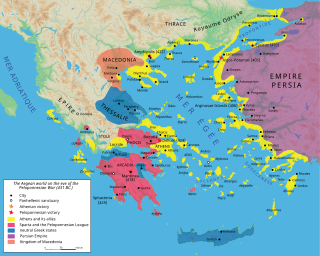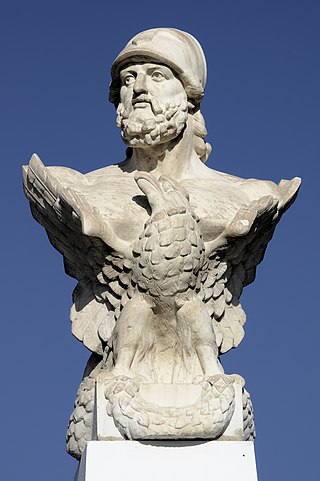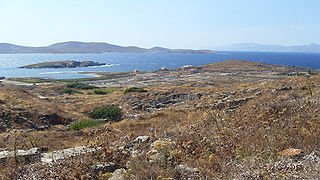Related Research Articles

The Delian League was a confederacy of Greek city-states, numbering between 150 and 330, founded in 478 BC under the leadership (hegemony) of Athens, whose purpose was to continue fighting the Persian Empire after the Greek victory in the Battle of Plataea at the end of the Second Persian invasion of Greece. The League functioned as a dual –offensive and defensive– alliance (symmachia) of autonomous states, similar to its rival association, the Peloponnesian League. The League's modern name derives from its official meeting place, the island of Delos, where congresses were held within the sanctuary of the Temple of Apollo; contemporary authors referred to the organization simply as "the Athenians and their Allies".

The 5th century BC started the first day of 500 BC and ended the last day of 401 BC.
This article concerns the period 459 BC – 450 BC.

This is a timeline of ancient Greece from its emergence around 800 BC to its subjection to the Roman Empire in 146 BC.
The Peace of Callias is a purported peace treaty that supposedly was established around 449 BC between the Delian League and the Achaemenid Empire and ended the Greco-Persian Wars. The peace would then be the first compromise treaty between Achaemenid Persia and a Greek city.
The Battle of Coronea took place between the Athenian-led Delian League and the Boeotian League in 447 BC during the First Peloponnesian War.

Pure Prairie League is an American country rock band which featured in its original lineup, singer and guitarist Craig Fuller, drummer Tom McGrail and steel guitarist John David Call, all from Waverly in southern Ohio. Fuller started the band in 1970 and McGrail named it after a fictional 19th century temperance union featured in the 1939 Errol Flynn cowboy film Dodge City. In 1975 the band scored its biggest hit with the single "Amie", a track that originally appeared on their 1972 album Bustin' Out. Pure Prairie League scored five consecutive Top 40 LPs in the 1970s and added a sixth in the 1980s. They disbanded in 1988 but regrouped in 1998 and continue to perform. The line-up has been fluid over the years, with no one member having served over the band's entire history. The band's most recent line-up consists of Call, drummer Scott Thompson, keyboardist Randy Harper, guitarist Jeff Zona and bassist Jared Camic. Other notable musicians to have played with Pure Prairie League include guitarists Vince Gill, Gary Burr and Curtis Wright.

Anti-Nowhere League are an English punk rock band, formed in 1979 by lead singer Animal, guitarist Magoo, Bones on drums and Chris Elvy on bass.

Cimon or Kimon was an Athenian strategos and politician.

Jørn Marumsrud Lande is a Norwegian hard rock and heavy metal singer. He is known for his work with the bands Ark, Beyond Twilight, Millenium, Vagabond, The Snakes, and most notably with power metal band Masterplan. He is also the most recurrent guest singer of the international supergroup Avantasia, and has worked as lead and guest singer in several projects. Currently, he is focusing his activities on his solo project Jorn. In 2014, Lande was hired by Riot Games to be the voice of the character Karthus, of the fictional heavy metal band Pentakill.

The Second Athenian League was a maritime confederation of Greek city-states that existed from 378 to 355 BC under the leadership (hegemony) of Athens. The alliance represented a partial revival of the Delian League, which had been disbanded in 404 BC following the defeat of Athens in the Peloponnesian War. The new League was centered in the Aegean and included over 60 states, among which were Kos, Mytilene, Rhodes, and Byzantium. It was primarily formed as a defensive alliance against Sparta and secondly the Persian Empire. The new League's main objective was to preserve peace in Greece and counterbalance Sparta's growing hegemony and aggression. The League largely revived Athenian influence in the Greek world, reestablishing it as the strongest naval power in the eastern Mediterranean. This time, Athens made conscious efforts to avoid the strict terms that had eventually rendered the previous Delian League unpopular. The alliance lasted until 355 BC, when most of the allied cities became independent following the Social War that broke out in 357 BC.

Classical Greece was a period of around 200 years in Ancient Greece, marked by much of the eastern Aegean and northern regions of Greek culture gaining increased autonomy from the Persian Empire; the peak flourishing of democratic Athens; the First and Second Peloponnesian Wars; the Spartan and then Theban hegemonies; and the expansion of Macedonia under Philip II. Much of the early defining mathematics, science, artistic thought, theatre, literature, philosophy, and politics of Western civilization derives from this period of Greek history, which had a powerful influence on the later Roman Empire. Part of the broader era of classical antiquity, the classical Greek era ended after Philip II's unification of most of the Greek world against the common enemy of the Persian Empire, which was conquered within 13 years during the wars of Alexander the Great, Philip's son.

The Battle of the Eurymedon was a double battle, taking place both on water and land, between the Delian League of Athens and her Allies, and the Persian Empire of Xerxes I. It took place in either 469 or 466 BCE, in the vicinity of the mouth of the Eurymedon River in Pamphylia, Asia Minor. It forms part of the Wars of the Delian League, itself part of the larger Greco-Persian Wars.

The Wars of the Delian League were a series of campaigns fought between the Delian League of Athens and her allies, and the Achaemenid Empire of Persia. These conflicts represent a continuation of the Greco-Persian Wars, after the Ionian Revolt and the first and second Persian invasions of Greece.
I Would Set Myself on Fire for You was an American experimental screamo band from Atlanta that formed in 2001 and broke up for unknown reasons in 2007.
Olaeis was a town of ancient Caria. The name is not attested but is inferred from epigraphic and other evidence. It was a polis (city-state) and a member of the Delian League.
Thasthara was a town of ancient Caria. It was a polis (city-state) and a member of the Delian League.
Hydai or Kydai was a town of ancient Caria. Its name does not appear in ancient authors, but is inferred from epigraphic evidence; its demonym was Hydaieis or Kydaieis (Κυδαιεῖς). It was a polis (city-state) and a member of the Delian League.
Maeandropolis or Maiandroupolis, also known as Maeandrus or Maiandros (Μαίανδρος), was a town of ancient Ionia in the territory of Magnesia on the Maeander. Its name reflects association with the Maeander River, on which it was situated. It was a member of the Delian League.
Gentinos was a town in ancient Troad. The inhabitants of Gentinos are cited in the tribute records of Athens between the years 452/1 and 444/3 BCE, so the city was part of the Delian League. Gentinos minted bronze coins inscribed «ΓΕΝ» or «ΓΕΝΤΙ».